 Petzlover
Petzlover East Siberian Laika is originated from Russia but Kanni is originated from India. Both East Siberian Laika and Kanni are having almost same height. Both East Siberian Laika and Kanni are having almost same weight. Both East Siberian Laika and Kanni has almost same life span. Both East Siberian Laika and Kanni has almost same litter size. East Siberian Laika requires Moderate Maintenance. But Kanni requires Low Maintenance
East Siberian Laika is originated from Russia but Kanni is originated from India. Both East Siberian Laika and Kanni are having almost same height. Both East Siberian Laika and Kanni are having almost same weight. Both East Siberian Laika and Kanni has almost same life span. Both East Siberian Laika and Kanni has almost same litter size. East Siberian Laika requires Moderate Maintenance. But Kanni requires Low Maintenance
 The East Siberian Laika Is a Russian dog developed for hunting in Siberia. The breed is a spitz type and good hunting large or small prey. It hunted squirrels and grouse as well as moose, mountain lions and bears. In the cold, snowy Siberia it was also a sled dog. There are four types of Russian Laikas: the West Siberian Laika, the Karelo-Finnish Laika, the East Siberian Laika and the Russo-European Laika.
The East Siberian Laika Is a Russian dog developed for hunting in Siberia. The breed is a spitz type and good hunting large or small prey. It hunted squirrels and grouse as well as moose, mountain lions and bears. In the cold, snowy Siberia it was also a sled dog. There are four types of Russian Laikas: the West Siberian Laika, the Karelo-Finnish Laika, the East Siberian Laika and the Russo-European Laika.
Dog from the Evenki National Territory, the Lake Baikal region, the Maritime Territory, the Irkutsk Province, and the Amur River basin were the breeding groups from which the East Siberian Laika developed. In 1947 the East Siberian Laika was designated as a separate breed from the other Laikas. All 4 Laikas were registered as separate breeds at the All -Union Cynological Congress. Biologist K.G. Abramov is credited with developing the first standard for the breed.
The breed is recognized by the American Canine Association, Inc (ACA), the Dog Registry of America (DRA) as well as the FCI. They are not recognized by the UKC or the AKC. Only the government breeds the East Siberian Laika in Russia.
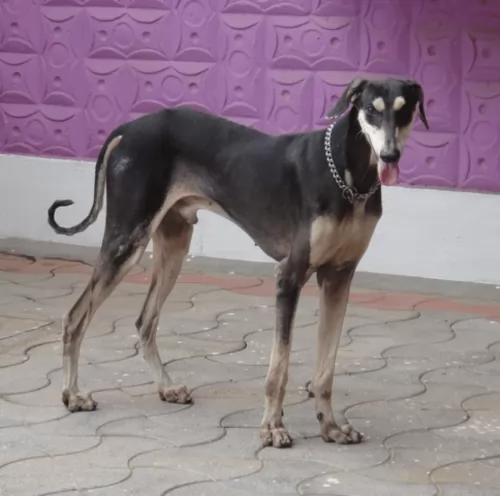 The Kanni dog is a rare South Indian Sighthound. It is also known as the Maiden's Beastmaster and this is because it is known to be protector and defender of its owner's property.
The Kanni dog is a rare South Indian Sighthound. It is also known as the Maiden's Beastmaster and this is because it is known to be protector and defender of its owner's property.
During ancient times, the dog was used for hunting but today it is essentially kept as a pet and it is registered with the Kennel Club of India.
 Within the East Siberian Laika there are several different types, but two important ones are the Evenki and Irkutsk. Of all the Laikas, the East Siberian is the most diverse in physique and in color. It is a rangy dog, heavy boned and proportionately appears square. It has triangular, erect ears and a tail that curves over his back. The shape of his head can vary within the regions and the types.
Within the East Siberian Laika there are several different types, but two important ones are the Evenki and Irkutsk. Of all the Laikas, the East Siberian is the most diverse in physique and in color. It is a rangy dog, heavy boned and proportionately appears square. It has triangular, erect ears and a tail that curves over his back. The shape of his head can vary within the regions and the types.
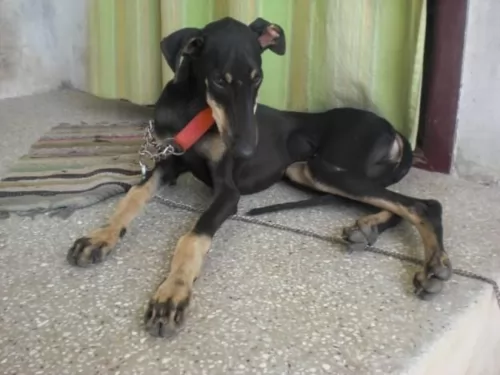 These dogs are tall, slim and deep chested, coming in two-color combinations, but it is the black and tan variety that is the true Kanni. There is also a cream variety. There are other color variations and each color has a unique name connected to it. The coat of the Kanni is short and smooth.
These dogs are tall, slim and deep chested, coming in two-color combinations, but it is the black and tan variety that is the true Kanni. There is also a cream variety. There are other color variations and each color has a unique name connected to it. The coat of the Kanni is short and smooth.
They are medium sized dogs standing at 62 to 67cm at the withers and weighing in the region of 18 – 22kg. When you first look at these dogs you might think of them as being similar to a Greyhound in looks. This is also because of their lean, muscular looks.
The eyes are a golden color, the nose black and the ears are a medium size and floppy with the long tail being semi-curved.
The Kanni has always been a hunting dog so he is used to being sharp, strong-willed, independent and alert as well as having some aggressive tendencies. It is also quite a reserved dog but he shows love and loyalty to his owner. He is independent and easy to train. It is a good thing to have him trained and socialized so that he is obedient to the simple commands you give him.
 The East Siberian Laika is bred to hunt and hunt large prey as well as small. For this reason, he usually doesn’t get along well with other dogs or other large predators. Other wise he is a calm; well-mannered dog and he can be a very good watch dog. They are very trainable and make great companion dogs.
The East Siberian Laika is bred to hunt and hunt large prey as well as small. For this reason, he usually doesn’t get along well with other dogs or other large predators. Other wise he is a calm; well-mannered dog and he can be a very good watch dog. They are very trainable and make great companion dogs.
The East Siberian Laika is the calmest and quietest of the four Russian Laikas. They are very affectionate and loyal to their families. They love to walk, jog, hike, run or camp with their family.
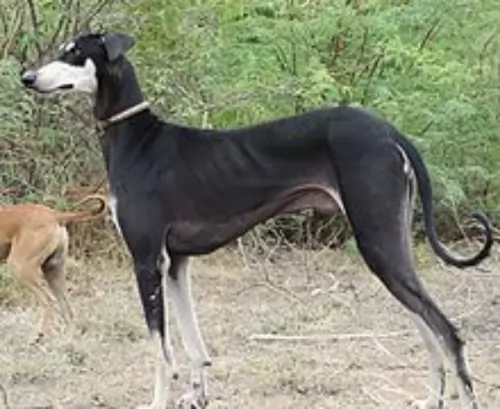 The Kanni looks much like your regular Doberman Pinscher but he has long tail and floppy ears. He is slim and agile but also powerful being able to have bursts of speed. It is why he requires a large place to run and play in, being better suited to a home with a large garden or farm.
The Kanni looks much like your regular Doberman Pinscher but he has long tail and floppy ears. He is slim and agile but also powerful being able to have bursts of speed. It is why he requires a large place to run and play in, being better suited to a home with a large garden or farm.
He is a playful, quiet dog but he has quite a bark on him and is known to be a good watchdog because of this. He is a protective dog too, devoted and loyal and making a splendid family pet.
 Besides injures related to hunting, the East Siberian Laika is prone to several other conditions including dysplasia and:
Besides injures related to hunting, the East Siberian Laika is prone to several other conditions including dysplasia and:
The contents of the dog’s abdomen come through the abdominal wall at the umbilicas. They are surgically repaired.
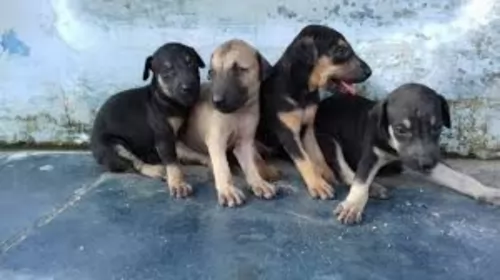 Not much is known about inherited health problems in this breed, and he can live up to a ripe old age of 16. It seems a pretty healthy dog, but still it helps to be aware of some of the more common dog illnesses that your pet can succumb to.
Not much is known about inherited health problems in this breed, and he can live up to a ripe old age of 16. It seems a pretty healthy dog, but still it helps to be aware of some of the more common dog illnesses that your pet can succumb to.
For first time dog owners it can be difficult knowing what health problems our beloved pets could suffer from. Every dog breed has certain diseases to which they are more prone to, but these are some common issues that most of our 4-legged friends will face -
This is a common dog health problem in India with the Kanni. There are so many things that disagree with their digestion. Most dogs may not want to eat their next meal, but when he is lethargic, he is hot and is vomiting, it is time to get your pet to the vet. This is because diarrhea causes rapid dehydration in dogs. To avoid diarrhea, steer clear of certain foods such as milk and dairy products as well as old, spoiled fatty foods. With diarrhea your dog must always have access to fresh, cool water.
This is a common dog disease, and ear infections can be painful and frustrating for your pet. He’ll scratch at his ear, shake his head and the inside of the ear may be red with a discharge. Check his ears for redness and try to keep them free from wax build up and dust.
Cleaning the ear is quite simple, and if you’re not sure how, the vet can do it quickly and effectively. Usually some dog ear cleaning solution on some cotton wool can do the trick. Ear infections are common in dogs like the Kanni with floppy ears.
It is essential to control fleas on your dog from word go. Fleas thrive in warm temperature and humidity and your pet will scratch, bite and lick at the spot. When you brush your pet, look through his fur for fleas and tell you vet about it if you discover ticks and fleas. A topical ointment could nip the problem in the bud. You may want to consider a flea collar for your pet.
Tapeworms, hookworms and roundworms for instance are commonly found in dogs, and even for healthy dogs, deworming tablets should be given from time to time. If your dog has worms, you’ll notice lethargy, loss of appetite, diarrhea and vomiting. It may be time to get your pet to the vet.
 This is an active, working dog and should be fed accordingly. Probably 1.5-2 cups of high quality dry dog food, two times a day.
This is an active, working dog and should be fed accordingly. Probably 1.5-2 cups of high quality dry dog food, two times a day.
The East Siberian Laika is an ancient breed and fairly healthy though prone to dysplasia:
The hip socket is not formed correctly, and the bone cannot fit properly causing lameness and/or arthritis.
Primary lesions and cartilage surrounding the elbow join and resulting in osteopathic injuries.
Again, this is a working dog. They need at least a half hour of moderate/vigorous exercise every day. A fenced in ran is a plus. You will also need to play with him to keep him from getting bored. Catch, flyball, or agility would all suit this breed well.
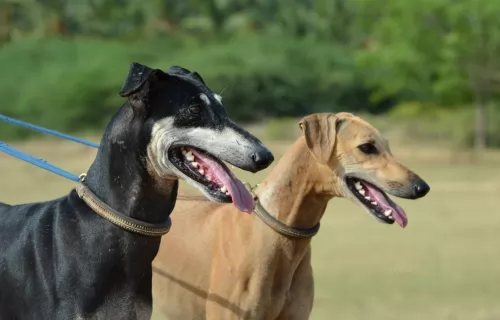 The Kanni is a low maintenance dog with his short coat. You can give him a good brush twice a week, check that his nails don't grow too long and also check his ears inside and out. Ticks and fleas are rife in hot weather and you want to give your dog a thorough check for these. You should also be checking your dog's teeth and brushing them 2 or 3 times a week. Dental problems can cause havoc with your dog's health.
The Kanni is a low maintenance dog with his short coat. You can give him a good brush twice a week, check that his nails don't grow too long and also check his ears inside and out. Ticks and fleas are rife in hot weather and you want to give your dog a thorough check for these. You should also be checking your dog's teeth and brushing them 2 or 3 times a week. Dental problems can cause havoc with your dog's health.
As a hunting breed, the Kanni is used to running so his needs for a good amount of exercise are quite high. While they do make good family pets, they hanker after wide open spaces and being busy. If you own one of these dogs, make sure that you exercise him often because otherwise he becomes frustrated and unhappy.
This dog has always been used to village life where he is free to roam wide open spaces. He is much more suited to country life than to city life, and as a pet, you will need to ensure that he receives a good amount of exercise.
Take him for walks, and if he's been socialized and trained, take him to the park and allow him off his leash to run.
The dog has always been fed traditional food such as porridge and milk but we know better now that dogs need protein too as well as a diet rich in vitamins and minerals to ensure his health.
You can feed him a top quality commercially manufactured dog food and add in some cooked chicken, rice and vegetables from time to time. It is expensive, but if you can, try and add in some raw meat occasionally as well. Your Kanni dog must always have access to fresh, clean water.